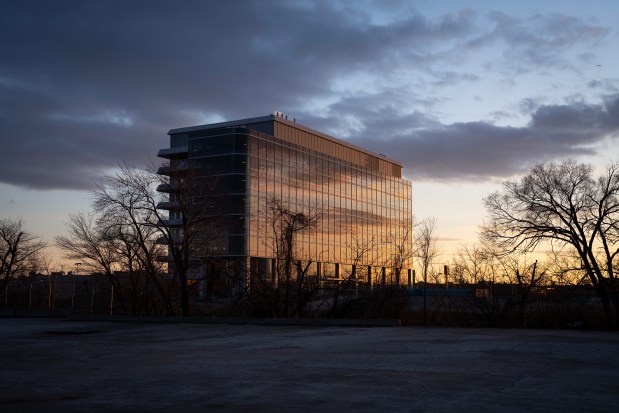It took six months for Maria Garza to finally feel home for good after leaving prison.
Garza was released from the Illinois Department of Corrections in June 2021 and spent the next six months bouncing from a friend’s home to her elderly godparents’ home to a motel, while also working as a hospital clerk and dog sitter and struggling to continue her bachelor’s degree classes in Northwestern University’s Prison Education Program. Those months were marked by uncertainty and worry as Garza was forced to adapt her schedule and constantly pivot around those who had kindly offered help.
Garza’s life changed dramatically in December 2021 when a church in Joliet offered her a two-bedroom home for an affordable $300 per month. From there, Garza has reestablished herself, taking on numerous responsibilities, working (and contributing to the state tax base) and, maybe most important, co-founding Challenge II Change, an organization that specializes in helping people facing similar hardships.
But far too few people exiting prison have the same kind of opportunity that Garza did.
That is why we are proud to stand with Challenge II Change and the dozens of statewide organizations in the Home for Good Coalition, a group of housing, reentry and community violence intervention organizations working to enact into law the Home for Good Program, which would ensure that affordable housing is available to people who are leaving prisons or jails and those enrolled in and employed at community violence intervention (CVI) organizations that work to reduce gun violence.
Studies show that housing instability is a major challenge for those exiting jail and prison and for those who are chronically exposed to violence. Far too many people with both the determination and the desire to find employment and become a contributing member of society struggle and fail because they lack a safe place to sleep and an address to put on an application. These setbacks, caused by systemic problems that can be fixed, ripple through families and neighborhoods and create instability and unsafe conditions for all of us.
It is time to respond boldly, with a statewide solution such as the Home for Good Program, HB3162 and SB2403. People with arrest and conviction records struggle to find stable and affordable housing options due to lack of employment opportunities and discrimination by landlords and employers. In addition, people exiting jail and prison are excluded from state and federally funded long-term housing for three months because of state and federal definitions of homelessness.
The need to address this issue is critical, as data and research show:
- 45% of people leaving state prisons are unemployed for at least three years.
- Only 34 affordable and available homes exist for every 100 extremely low-income Illinois renters.
- 60% of CVI program participants request support finding or affording housing, and 80% have arrest or conviction records, which creates a significant barrier to finding work or securing a lease.
- People leaving prison don’t qualify for some existing homelessness supports upon release.
- Nearly 40% of people leaving prisons return within three years, with each return costing Illinois taxpayers an estimated $190,000. However, research shows that stable housing reduces the likelihood of returning to prison and is far less expensive than reincarcerating a person.
The Home for Good legislation builds upon existing, but limited, housing programs and reentry housing pilots that have proved to help people build stable lives. It would allocate $103 million for the Illinois Housing Development Authority and the Illinois Criminal Justice Information Authority to expand those housing opportunities. The program will fund rental assistance for people with criminal records who can contribute up to 30% of their income; grant money to acquire, build and rehabilitate affordable transitional and permanent housing; wraparound support services for those seeking housing; and the creation of the Home for Good Institute, a training center for organizations that want to provide this kind of housing.
We understand this initial price tag in a year of austerity seems high. But we also know this is a good investment that would pay incredible dividends by helping people and families, saving taxpayers money and making communities safer.
It will create meaningful opportunities for others like Garza. Investing $103 million in the program would also save taxpayers $650 million over the next three years. For every dollar invested in Home for Good, more than $6 would be injected back into the Illinois economy, creating widespread opportunities to stabilize communities and address public safety. And providing housing support for returning residents has been shown to lower return to prison rates by up to 50%.
The current housing ecosystem simply doesn’t reach enough people to ensure widespread positive outcomes like this. So, let’s expand our response to housing needs in this state. Let’s provide community organizations committed to ending gun violence with a real solution for clients and staff who need housing. Let’s provide those returning home from incarceration with housing options they can access. Let’s stop the revolving door at the prison. Let’s welcome them home for good.
State Rep. Maurice West represents the 67th District and is the sponsor of the Home for Good measure in the Illinois House. Arne Duncan is a managing partner of Emerson Collective and founder of Chicago CRED, a member organization of the Home for Good Coalition.
Submit a letter, of no more than 400 words, to the editor here or email letters@chicagotribune.com.





